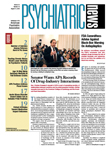It's already possible to test people in midlife to see whether they carry a well-documented genetic risk factor for Alzheimer's disease, the e4 variant of the APOE (apolipoprotein E) gene (Psychiatric News, October 4, 2002).
Now a blood test to see whether people in midlife are at risk of Alzheimer's later in life may soon be possible.
The reason is because a new study, conducted by University of Pittsburgh researchers and in press with Biological Psychiatry, has found an inverse association between levels of an inflammatory substance in the blood and the size of the brain's memory center (the hippocampus) in 76 generally healthy individuals aged 30 to 54. The substance is the cytokine interleukin-6. Moreover, this link held even when possibly confounding factors such as age, gender, education, body fat, blood pressure, and smoking were considered.
Furthermore, subjects with smaller hippocampi were found to perform worse on memory tests than those with larger hippocampi. Thus, high levels of interleukin-6 in the blood at midlife may be a marker for memory decline and possibly for risk of Alzheimer's later in life, the researchers concluded.
Exactly how elevated levels of interleukin-6 in the bloodstream at midlife might contribute to the development of later-life Alzheimer's is not known, the researchers wrote in their study report. However, animal research has revealed that interleukin-6 in the bloodstream can interfere with hippocampal function, learning, and memory, they pointed out. Also, fat tissue is a rich source of interleukin-6 in the bloodstream, and obesity in midlife and later life has been found to predict cognitive decline and the incidence of dementia, they noted. So persons who are overweight in midlife might be courting an increase in interleukin-6 in the bloodstream and then, through the interleukin-6 boost, Alzheimer's, they speculated.
The study findings might have implications for the early detection of Alzheimer's and perhaps even for its prevention, the researchers believe.
“We have just put in a grant application” to find out whether high levels of interleukin-6 in midlife indeed predict future hippocampal shrinkage and memory loss, the lead investigator, Anna Marsland, Ph.D., an associate professor of psychiatry at the University of Pittsburgh, told Psychiatric News.
If they find that high levels of interleukin-6 in midlife truly presage future hippocampal shrinkage and memory loss, then “a next step will be considering possible preemptive interventions,” she said. In fact, there is already evidence that anti-inflammatory drugs such as ibuprofen may help prevent Alzheimer's (Psychiatric News, July 4).
The study was funded by the National Institutes of Health, the John D. and Catherine T. MacArthur Foundation, and the National Alliance for Research on Schizophrenia and Depression.
An abstract of “Interleukin-6 Covaries Inversely With Hippocampal Grey Matter Volume in Middle-Aged Adults” is posted at<www.journals.elsevierhealth.com/periodicals/bps> under “Articles in Press.” ▪
